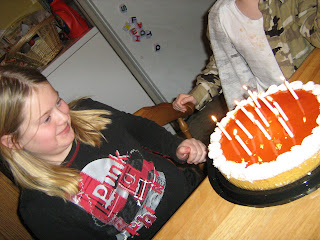I can hardly believe this will be the last post for Sunday Inspirations here in 2008. I can hardly believe I started this blog a mere 6 months ago!
For this last post, and before we hit the new year, I wanted to blog on a word I have come to moan at the moment it is mentioned. I was doubly excited when the young women's president in the ward called to ask me to fill in for the regular teacher today, and asked me to put together a lesson on this very thing. What is this word?
Resolutions.
For too many the idea of New Year's resolutions has become a joke: promises made and broken before the year is half gone. If your biggest resolution this year is to actually keep one of your resolutions, I would suggest changing just one word.
Instead of making resolutions, make goals.
(From here on out I'm putting in my I gave today.)
Goals demand to be written down, step-by-step. Goals will show just how far you’ve come, as well as what needs to happen next to accomplish it. Goals require self-discipline, just as resolutions, but offer hope and guidance when we’ve slipped along the way.
Why is setting goals is so important?
Elder
M. Russell Ballard (an apostle in the Church of Jesus Christ of Latter-day Saints - nicknamed the
Mormon Church) spoke about the value of making goals to a group of young, single adults: “…
You must cultivate a desire to develop the skill of setting personal worthy and realistic goals…If we don’t set goals in our life and learn how to master the technique of living to reach our goals, we can reach a ripe old age and look back on our life only to see that we reached but a small part of our full potential. When one learns to master the principle of setting a goal, he will then be able to make a great difference in the results he attains in this life.”
The Church put out a pamphlet called “10 Ways to Teach Values in the Home.” One of the values mentioned is helping children to set goals. From the moment a child is baptized a member of this Church at eight years old they are encouraged to begin setting goals. It starts with the "
Faith in God" program. From there we move on to the “
Duty to God” program for the young men and "
Personal Progress" for the young women. Even as adults we’re encouraged to set and accomplish goals through the "Pursuit of Excellence" program. Missionaries set daily goals. Even parents and leaders in this Church are encouraged to help their youth set and accomplish goals. Not just any goals, but goals that will challenge you.
Why do you think we are encouraged to begin learning the value of goal setting from such a young age? The earlier someone begins the learning process – for anything – the easier it will be to maintain later in life. Not only this, but once a person knows they can accomplish even the little things, trying to accomplish bigger things doesn’t feel so daunting.
So what’s the first step in setting goals? It might not be quite what you think. The first step is to decide on something to do, but to do so with prayer. One of the greatest and most overlooked aids in setting and accomplishing goals is to make sure the Lord is a part of it. Discuss with Him what your plans are for the future. What are your interests? Is there something in the coming school year you can look forward to and plan toward? Do you feel particularly impressed to learn something new, or replace a bad habit?
Keep in mind you need to set clear, specific, realistic goals. Don’t decide you’re going to run a marathon and then think you’ll be able to do it by summertime. Instead set the goal to get in better shape through running, and go from there.
Next step – Elder Ballard encourages you to write it down! As long as the resolution lives just in your head you will have set yourself up for failure before you’ve even begun. I would encourage you to write it down more than once. In fact, write it down many times and put it in strategic places to help give you daily reminders of what you are trying to accomplish. Keep a copy in your scriptures, in your locker (if at school), on the wall of your room, etc., wherever you might frequently find it.
Think of substitutions you can put in place if it will help you reach your goal. If you’ve set a goal to get rid of a bad habit think of ways to replace the habit. Instead of watching television for a billion hours in a week put that time toward learning something new, like how to play the guitar. If you have a problem with saying bad words, one of your first steps can be thinking of a simple or silly word to replace it. Substitution is a fantastic way of helping you meet those types of goals.
Set mini-goals along the way. These will not only help keep you on course, but will help you see how far you’ve come! They’re easy to accomplish and make the big picture seem much more overwhelming.
For example. Anyone who has been to my house knows the room at the very back belongs to my boys, and that it’s typically in a state of extreme chaos. How can two little boys who excel at making the mess possibly restore order? With mini-goals. Josh is first placed in charge of looking for all the dirty clothes and putting them in their laundry hamper. While he’s doing this Brian is in charge of looking for all their books and placing them back on the bookcase. When Josh is done he might be put in charge of putting pillows and blankets back where they belong, as well as looking for toys under the bed, while Brian starts putting the toys away. Mini-goals.
Sometimes goals we really want to accomplish feels like attempting to jump across the Grand Canyon – impossible. But if we take those big, giant goals, and break it up into smaller goals, the end result doesn’t feel quite so impossible any more.
The great thing about goals is they’re flexible. You might reach a mini-goal far sooner than you’d expected. If that’s the case you can easily move on. On the other hand you might find one of those mini-goals is taking longer than you’d expected. That’s okay too. Allow yourself wiggle room. Have the self-discipline necessary to push past any bumps in the road, and don’t forget to continually pray for guidance, endurance, and support along the way.
So let’s take a moment and plot out a goal someone might set for his/herself in this next year. I mentioned learning to play the guitar. Let’s keep the goal realistic and remember we won’t be playing like a rock star in just one year. Let’s say we’ve made the decision, we’ve prayed about it, and we’ve written the goal down. What’s next on the plan?
LEARN TO PLAY GUITAR:
1. Research how much a new or used guitar would cost. Do you want to play acoustic or electric? Do you have the abilities to teach yourself or do you need a teacher? How much would lessons be? What books might be helpful?
2. Figure out a way to earn the money necessary. Do you have a job, or can you find ways to earn a few dollars here and there? Have you saved up enough money for the necessary books or for lessons? Or do you know someone who could give you lessons for free or in trade?
3. Once you have your guitar, and your books, and if needed your teacher, plan out the necessary practice time – and keep in mind developing a new talent takes a lot of practice.
4. Go at your own pace. Some people pick things up quickly, others need more time. Don’t ever be discouraged by the time it takes to learn something new, or change something in your life. Be patient.
5. Stretch yourself. Don’t become complacent with staying in one place. Say you’ve learned some cool songs, you’ve got the basic chords down, and you’re pretty happy with where you are. That’s when it’s time to push yourself a little harder. You never know how great you could become unless you first try.
Your goals can be spiritually grounded: would you like to learn more about other religions, or more about the history surrounding the Bible and/or Book of Mormon, or more about your Patriarchal Blessing and/or the tribes you belong to. Your goals can be geared away from gospel matters: would you like to learn to draw, to write, to try your hand at photography, attempt to break into the world of computers, or graphic design? The ideas are only as limited as your imagination.
Now don’t forget as you look through all these mini-goals that you have the entire year to accomplish them all – not only this, but you don’t have to accomplish them all this year. Life will happen. Things will come up. Perhaps the money you’d been saving for the guitar suddenly needed to be used to help pay for an emergency. Just remember – that’s okay. Don’t allow yourself to get too discouraged. Discouragement is one of Satan’s greatest tools. If you find yourself bombarded with setbacks, take it to the Lord, trust in Him, and try, try again.
As Elder Ballard tells us: “
If your goals are righteous, of God-given perspective, eternal in their nature, then go for them. Pray for the inner strength to have the discipline to do those things that will guarantee through your activity and your life that you will reach your goals. Then, I think, perhaps as important as anything, we have to have faith. We have to have faith in God. We have to have faith in the Lord Jesus Christ. And oh, how desperately we have to have faith in ourselves.”
We start making goals when we are young. We continue setting goals even as we get older. When we prove to ourselves we can accomplish the simpler things, we will gain more and more faith in our abilities to accomplish the big things – like finding the courage and means to go on a mission, to hold out against the world and maintaining our purity, by finding someone who is worthy to be sealed to us in the temple for all eternity.
As you think about setting goals for this new year, take the matter to the Lord. Ask what course He would have to take, and then trust in Him to help you along the way.























